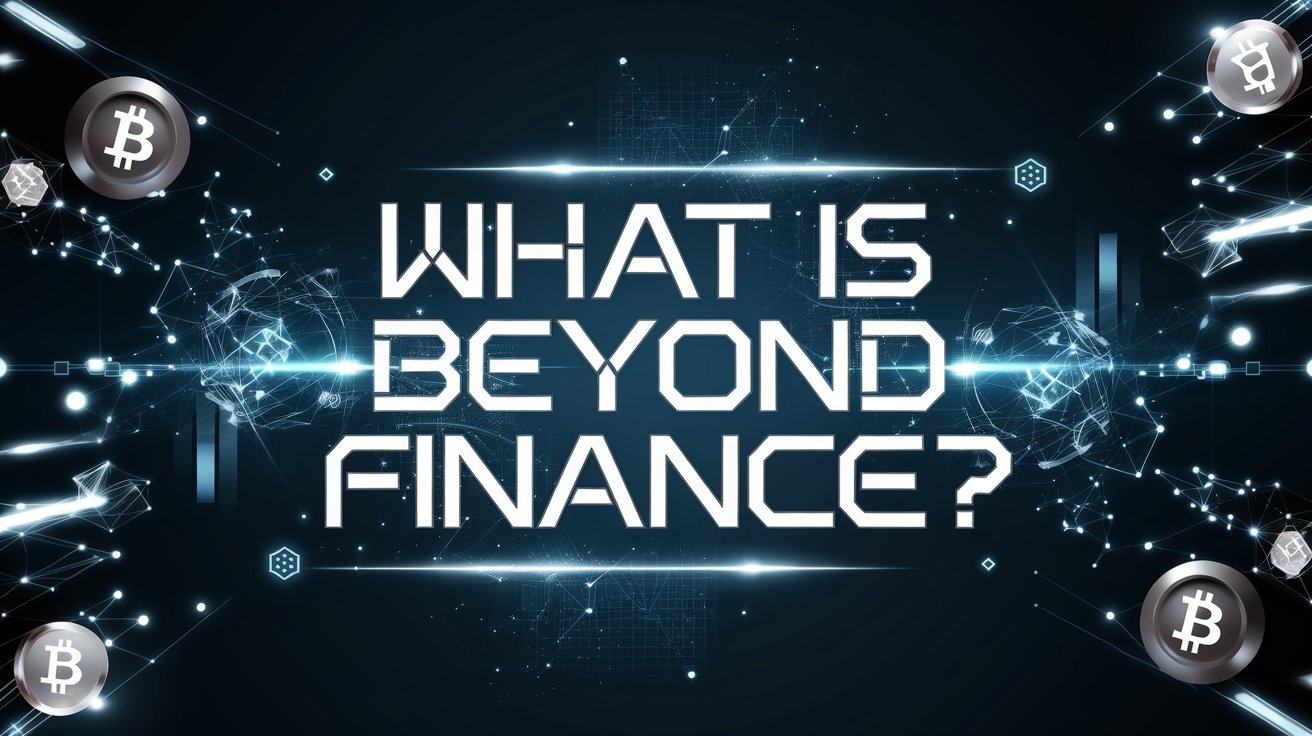The world of finance is rapidly evolving, driven by technological advancements, changing consumer behaviors, and a global push towards greater financial inclusion. Beyond traditional finance lies a landscape filled with innovation, disruption, and opportunities that are reshaping the way we think about money, investments, and economic systems. This blog will delve into what “Beyond Finance” truly means, exploring the future of financial services, the role of technology, and the emerging trends that are transforming the financial landscape.
Understanding Beyond Finance
“Beyond Finance” refers to the next generation of financial services and innovations that extend beyond the traditional boundaries of banking, investments, and financial management. This concept encompasses a wide range of developments, including FinTech (Financial Technology), decentralized finance (DeFi), digital currencies, and the broader adoption of artificial intelligence (AI) and machine learning in financial decision-making.
The idea of Beyond Finance is rooted in the belief that the financial sector is on the cusp of a significant transformation, one that will fundamentally change how individuals and businesses interact with money. This transformation is being driven by several key factors, including:
- Technological Advancements: The rise of digital platforms, blockchain technology, and AI is enabling the development of new financial products and services that are more efficient, transparent, and accessible.
- Consumer Expectations: Today’s consumers demand more personalized, convenient, and transparent financial services. They are increasingly turning to digital platforms for everything from payments to investments, pushing traditional financial institutions to innovate.
- Regulatory Changes: Governments and regulatory bodies around the world are adapting to the new financial landscape by developing frameworks that encourage innovation while ensuring consumer protection and financial stability.
- Financial Inclusion: There is a growing recognition of the need to extend financial services to underserved populations, particularly in developing countries. Beyond Finance aims to create a more inclusive financial system that provides access to banking, credit, and investment opportunities for everyone.
The Rise of FinTech: Revolutionizing Financial Services
FinTech, or Financial Technology, is at the heart of the Beyond Finance movement. FinTech refers to the use of technology to deliver financial services in new and innovative ways. Over the past decade, FinTech has disrupted traditional financial services by introducing digital platforms that offer everything from online banking and mobile payments to robo-advisors and peer-to-peer lending.
One of the most significant impacts of FinTech has been the democratization of financial services. Digital platforms have made it easier for individuals to access financial products and services, often at a lower cost than traditional banks. For example, mobile payment apps like PayPal and Venmo have simplified the process of transferring money, while robo-advisors like Betterment and Wealthfront have made investing more accessible to a broader audience.
FinTech has also spurred innovation in lending and credit services. Peer-to-peer lending platforms like LendingClub and Prosper connect borrowers directly with investors, bypassing traditional banks and offering more competitive interest rates. Additionally, digital lenders are using AI and machine learning to assess credit risk more accurately, enabling them to offer loans to individuals who may have been overlooked by traditional lenders.
Another area where FinTech is making a significant impact is in the realm of financial inclusion. Mobile banking platforms like M-Pesa in Kenya have brought banking services to millions of unbanked individuals in developing countries, allowing them to save money, make payments, and access credit for the first time. This has had a transformative effect on local economies, empowering individuals and small businesses to participate in the financial system.
Decentralized Finance (DeFi): A New Financial Paradigm
Beyond traditional FinTech lies the rapidly growing world of decentralized finance, or DeFi. DeFi refers to a new financial system built on blockchain technology, where financial services are provided without the need for intermediaries like banks or brokers. Instead, DeFi relies on smart contracts—self-executing contracts with the terms of the agreement directly written into code.
DeFi has the potential to revolutionize the financial industry by creating a more open, transparent, and accessible financial system. Unlike traditional finance, which is often centralized and controlled by a few large institutions, DeFi operates on decentralized networks, where anyone with an internet connection can participate.
One of the most significant innovations in DeFi is the creation of decentralized exchanges (DEXs). Unlike traditional exchanges, which require users to deposit their funds with a central authority, DEXs allow users to trade directly with one another using smart contracts. This eliminates the need for intermediaries, reducing costs and increasing security.
DeFi also offers a wide range of financial services, including lending, borrowing, and earning interest on digital assets. For example, platforms like Aave and Compound allow users to lend their cryptocurrencies and earn interest, while also enabling borrowers to access loans without the need for a traditional credit check.
The rise of DeFi has also led to the creation of stablecoins—digital currencies that are pegged to a stable asset, such as the U.S. dollar. Stablecoins offer the benefits of cryptocurrencies, such as fast and low-cost transactions, without the volatility typically associated with digital assets. This has made them an attractive option for individuals and businesses looking to conduct transactions or store value in a more stable form of currency.
While DeFi is still in its early stages, it has the potential to disrupt the traditional financial system in significant ways. By removing intermediaries and enabling peer-to-peer transactions, DeFi can reduce costs, increase transparency, and provide financial services to a broader audience.
Digital Currencies and the Future of Money
Digital currencies, including cryptocurrencies and central bank digital currencies (CBDCs), are another key component of the Beyond Finance landscape. These digital assets represent a new form of money that is designed to be used in a digital economy.
Cryptocurrencies like Bitcoin and Ethereum have gained significant attention in recent years as decentralized, digital forms of money that operate outside of the traditional financial system. These cryptocurrencies are built on blockchain technology, which allows for secure, transparent, and tamper-proof transactions.
Bitcoin, the first and most well-known cryptocurrency, was created in 2009 as a decentralized alternative to traditional fiat currencies. Since then, the cryptocurrency market has grown rapidly, with thousands of different digital assets now available. While cryptocurrencies have been praised for their potential to disrupt the financial system, they have also faced criticism for their volatility and lack of regulation.
In response to the rise of cryptocurrencies, central banks around the world are exploring the development of central bank digital currencies (CBDCs). Unlike cryptocurrencies, which are typically decentralized and operate on public blockchains, CBDCs are digital versions of a country’s fiat currency and are issued and regulated by the central bank.
CBDCs offer several potential benefits, including increased efficiency in payments, reduced costs, and improved financial inclusion. For example, a CBDC could make it easier for individuals in remote or underserved areas to access banking services, as they would only need a mobile phone and an internet connection to conduct transactions.
The development of CBDCs is still in the early stages, with several countries, including China, Sweden, and the Bahamas, conducting pilot programs. However, the widespread adoption of CBDCs could have far-reaching implications for the global financial system, potentially reducing the need for physical cash and reshaping the role of traditional banks.
The Role of Artificial Intelligence and Machine Learning in Finance
Artificial Intelligence (AI) and Machine Learning (ML) are playing an increasingly important role in the Beyond Finance landscape. These technologies are being used to automate processes, improve decision-making, and create more personalized financial services.
One of the most significant applications of AI and ML in finance is in the area of data analysis. Financial institutions generate vast amounts of data, and AI algorithms can analyze this data more quickly and accurately than humans. This enables financial institutions to identify trends, assess risks, and make more informed decisions.
AI is also being used to create more personalized financial products and services. For example, robo-advisors use AI algorithms to create customized investment portfolios based on an individual’s risk tolerance, financial goals, and other factors. These robo-advisors can automatically rebalance portfolios, making adjustments as needed to optimize returns.
Another area where AI and ML are making an impact is in fraud detection and prevention. Financial institutions are using AI to analyze transaction data in real-time, identifying patterns that may indicate fraudulent activity. This allows them to respond more quickly to potential threats, reducing the risk of financial loss.
In addition to these applications, AI and ML are also being used to develop new financial products, such as algorithmic trading strategies and credit scoring models. These technologies have the potential to make financial services more efficient, accessible, and tailored to individual needs.
Financial Inclusion: A Key Goal of Beyond Finance
One of the most important goals of Beyond Finance is to create a more inclusive financial system that provides access to financial services for everyone, regardless of their location, income, or background. Financial inclusion is critical for reducing poverty, promoting economic development, and improving quality of life.
Despite significant progress in recent years, billions of people around the world still lack access to basic financial services, such as bank accounts, credit, and insurance. Beyond Finance aims to address this gap by leveraging technology to create new financial products and services that are accessible to underserved populations.
Mobile banking and digital wallets are among the most promising tools for promoting financial inclusion. These platforms allow individuals to access banking services using a mobile phone, without the need for a physical bank branch. This is particularly important in developing countries, where access to traditional banking infrastructure may be limited.
In addition to mobile banking, other innovations, such as microfinance and peer-to-peer lending, are helping to extend credit to individuals and small businesses that may not qualify for traditional loans. These services provide much-needed capital for entrepreneurship and economic development in underserved communities.
The expansion of digital payment systems is also playing a crucial role in financial inclusion. Digital payments can reduce the costs and barriers associated with traditional payment methods, making it easier for individuals and businesses to participate in the formal economy.
Conclusion: The Future of Beyond Finance
The concept of Beyond Finance represents a fundamental shift in the way we think about money, financial services, and economic systems. As technology continues to evolve, the boundaries of finance will continue to expand, creating new opportunities for innovation and disruption.
While there are still challenges to overcome, such as regulatory concerns and the need for greater financial literacy, the future of finance looks increasingly digital, decentralized, and inclusive. Whether through FinTech, DeFi, digital currencies, or AI-driven financial services, the world of Beyond Finance is poised to transform the global economy, providing more efficient, accessible, and personalized financial solutions for everyone.
For investors, businesses, and consumers, understanding the trends and technologies driving Beyond Finance is essential for navigating the future of financial services. By staying informed and adapting to these changes, you can position yourself to take advantage of the opportunities that lie ahead in this exciting new era of finance.





